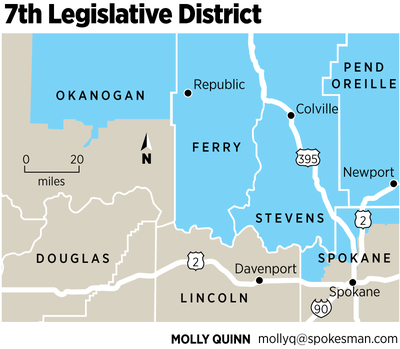House seat representing northeastern Washington is Joel Kretz’s to lose

As far as both candidates are concerned, the legislative district that represents a large portion of northeastern Washington is longtime incumbent Rep. Joel Kretz’s to lose.
His opponent, Libertarian Mike Foster, admits he doesn’t have much of a shot, especially after capturing less than 22 percent of the vote in the August primary. But this is his first run for office, and Foster says it takes time to build a name among voters.
“I don’t want to be pessimistic of myself, but I do want to be realistic as well,” he said. “You have to build up over time, and I’m not one to think short term.”
His platform centers on not being a part of the establishment. As a registered Libertarian for two years, he’s not “beholden to a position or party power,” he said. Meaning, he wouldn’t have to make deals within his party – the only people he’d be beholden to are the people he represents.
He believes politics have become stale, and he’s tired of politicians only voting along party lines.
“When you start taking leadership positions on within the Republican Party, the establishment is going to try and push you to do certain things,” he said. “I’ve met Joel Kretz, and I think he’s a good guy, but when you get to that level in politics, you start having to make deals from time to time.”
Kretz was first elected to the state House of Representatives in 2004, and since then, he’s either defeated his opponents handily or run unopposed. As a Republican, his voting record meshes well with his mostly-Republican district: He voted for the privatization of liquor sales in 2011 and against authorizing same-sex marriage in 2012, for example.
This last summer, though, Kretz spent a large chunk of his time and energy on a problem plaguing much of his 11,000-square-mile, mostly rural district: wildfires.
“I’m still waiting for a summer,” he said. “Because the last two were all fires.”
For the past three years, fires in Eastern Washington have ravaged more than a million acres of land, burned hundreds of homes and cost millions in damage. In Okanogan and Ferry counties, more than 500,000 acres of land burned last year in the Okanogan Complex fire.
And while private landowners with 50 forested acres pay about $17 each year to fund state readiness to fight wildfires, firefighting costs statewide totaled about $170 million – much higher than funds could cover.
That’s why Kretz introduced a bill this year that allows controlled burning of forested land east of the Cascade Mountains, which he hopes would help stop fires from spreading. When the Clean Air Act was passed in 1991, prescribed burning of land started to decline. This new legislation, signed into law by Gov. Jay Inslee in April, would restart the practice and direct the state Department of Natural Resources to evaluate prescribed burnings’ effectiveness and monitor their impact on air quality.
“We’ve been trying to do these things for a long time,” Kretz said. “But it was tough, because the environmental community sees it as an excuse to go logging.”
In addition to fires, Kretz has another culprit lurking in the woods: wolves. He said he’s received multiple calls from residents throughout his district who’ve had problems stemming from wolves, especially from farmers losing their stock. This summer, he’s met with environmental groups on how best to curb the wolf population.
“That’s taking about 16 hours of my day right now,” he said. “It’s not really a long term, it’s how do we get through tomorrow.”
If elected, Foster said he would start getting to work on reducing “unnecessary taxes.” Specifically, those that fund government regulatory departments that he sees as double-dipping, such as the Department of Ecology and the Department of Natural Resources, for instance. He’d also like to open Washington’s borders to outside health insurers, something he hopes could lower the cost of health care.
Then there’s education. Instead of dumping money into the state Office of the Superintendent of Public Instruction, he’d rather give it back to a local level.
“We’ve doubled the budget for education since 1970, and the results have been flat,” he said. “Take that administrative money, give it directly to principals, and let the schools compete.”
So far, Foster has raised about $3,500 for his campaign, most of which is his own money. Kretz, on the other hand, has raised just shy of $100,000 and spent $75,000.
After winning the primary with about 78 percent of the vote, Kretz’s campaign is focused on raising money for other candidates in the Republican Party to try to get a House majority. And while the race seems like a slam dunk for the Republican incumbent, he’s remained humble, saying he appreciates the competition from Foster.
“He’s a nice guy and we agree on a lot of things,” he said. “I think it’s good that he ran. I really, honestly, believe everyone should do it at least once.”